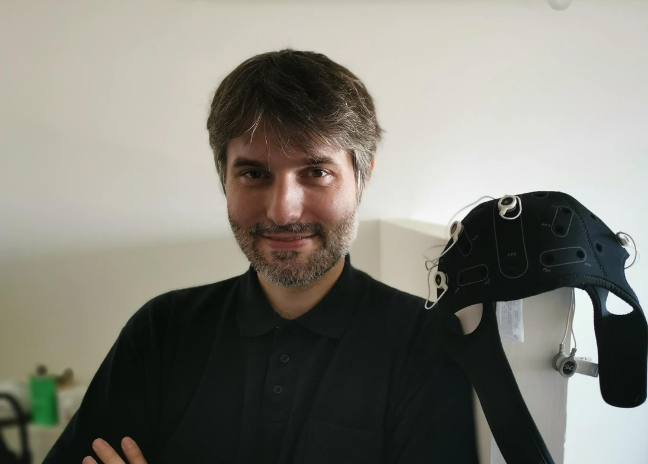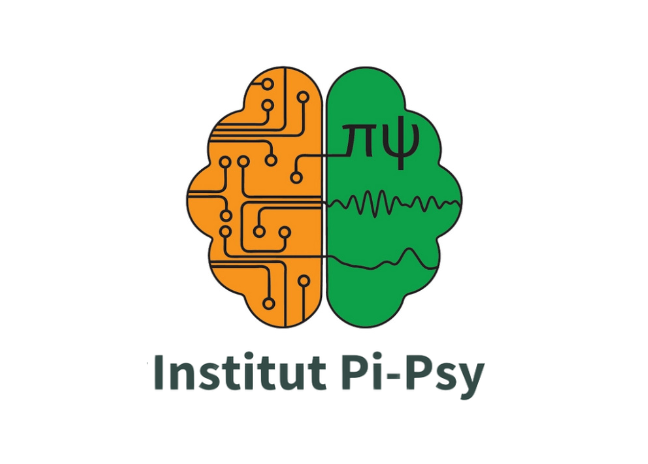The Pi-Psy Institute, a deep tech start-up to revolutionize the world of psychotherapy
The Pi-Psy Institute, born out of the Brain Plasticity Laboratory (CNRS / ESPCI Paris – PSL), is a deep tech start-up specializing in Cognitive Neuroscience and Cognitive Behavioral Therapy (CBT). It is developing innovative approaches in applied psychology. Here we meet its co-founder, the clinical psychologist and researcher in Cognitive Neuro-Psychopathology, François-Benoit Vialatte.

PSL: Can you tell us about the Pi-Psy Institute and the different services you offer?
François-Benoit Vialatte: The Pi-Psy Institute is a deep tech start-up positioned at the interface between IT, engineering sciences and neuropsychology. Our aim is to modernize the field of applied psychology, especially psychotherapy. In terms of R&D, our research focuses on modeling psychopathologies and psychotherapies. We carry out clinical experiments around neurofeedback and the uses of virtual reality.
Our range of activities is fairly extensive. We have also created a body to train professionals in the sector and we offer psychotherapy and psychological assessments.
PSL: How did the idea of founding a start-up come about?
François-Benoit Vialatte: We started from a simple and shared observation: research in psychology is too often separated from the world of clinical psychology, yet these two fields would both have much to gain by working more closely together. Our goal was to decompartmentalize research so that it could benefit patients more quickly, by improving care, for example; and so that new data would become available, which would speed up scientific studies in progress.
On this basis, the start-up project was self-evident. Because our work was multidisciplinary, it was complex to set up as a traditional public research project. And even this were possible, we quickly realized the limitations of the system. By developing our work in a laboratory, we would have been project sponsor but not the project manager of the research part. We would also have had to outsource our clinical activity to a hospital, which would have required training up staff to use our methods, causing costs to skyrocket.
PSL: You are a research professor and you have taught at ESPCI Paris – PSL. How are the Pi-Psy Institute and the ESPCI Brain Plasticity Laboratory linked?
François-Benoit Vialatte: Our research into neurofeedback and the subsequent patent were “born” in the brain plasticity laboratory, while we were working on the brain-computer interface. The idea for the start-up came later, and since then, we have maintained strong scientific ties with our original laboratory. We are regularly in discussion with the researchers, and I have co-supervised some of their PhD students.
PSL: With the help of PSL Valorisation you have filed a patent and Université PSL has acquired a stake in your company. What were the steps in this process?
François-Benoit Vialatte: The steps were fairly standard, so to speak. Once we thought that we had a patentable innovation, we contacted the Technology Transfer department. They studied our file and confirmed our hunch, then supported us through all the stages in the patent filing process.
Next, PSL Valorisation supported us through the process of creating a start-up and helped us consider the various possible options. We could have set up as a company, without creating formal ties, but we preferred to retain a link with the university and bring it in as a stakeholder. This seemed to be compatible with our approach, and it is reassuring to have their support.
In particular, support from PSL Valorisation has been invaluable for constructing a business plan, obtaining public and private funding, and developing press contacts.
PSL: You have combined Deep tech and cognitive sciences for an innovative approach. What do you think is the role of innovation in the psychotherapy sector?
François-Benoit Vialatte: One of the main challenges on a scientific level is modeling the processes involved in psychopathologies and psychotherapies. Our core method/technology is based on the construction of brain-computer interfaces, and responds in part to this challenge. It enables us to measure a person’s fluctuations in attention in real time. Collecting these data gives patients and physicians the key elements needed to provide neurofeedback in order to improve the ability to concentrate, for example. In concrete terms, patients are fitted with electrodes and they have in front of them a graphical interface with a game. A psychologist is on hand to guide them as they explore.
Note that it is in no way a question of letting the patient work alone with the headset. We are still in the field of psychotherapy, the presence of the therapist is essential. Neurofeedback with a human guide is not intended to condition brain activity, but rather to help with awareness. This process is similar to what is usually used in “traditional” psychotherapy, with the notable difference that by using neurofeedback, results can be achieved in just 4 or 5 sessions, compared to around thirty sessions with a traditional protocol.
And the need is there. As a result of the health crisis there has been a sharp increase in depressions. We are less aware of it but attention deficit disorders are very common in people with depression, post-traumatic stress disorder, etc. At the present time, however, psychotherapists are not trained in this.
In the next 5 to 10 years, we would like to see all therapists trained in this technique and using headsets. This would ensure that patient care could start sooner and would reduce patient suffering.
PSL: You also use Machine Learning in your research. What form does this take?
François-Benoit Vialatte: Yes indeed, and this is fairly new in this field. The classification of psychiatric illnesses is based on some very old methods. While there are different care protocols, they necessarily focus on a limited number of mental disorders, and for example, they don’t always take comorbidities into account. What is needed is a scientific protocol combining the different techniques and factors. We are convinced that modeling can give a better understanding of what a psychopathology is.
Our aim is to use machine learning techniques to build bridges between psychopathologies and modeling of the brain. To do this, we rely on our data collections and various protocols carried out on cohorts. We identify invariants, i.e. points common to several situations, and their effects. Depending on whether the patient’s condition worsens or improves, these measurements enable us to isolate the determinant action that will result in recovery.
Ultimately, our goal is to develop a method to monitor patients throughout their sessions. Artificial Intelligence would then become the therapist’s assistant. Notably, young practitioners would have factual data available to them to support them in their practice.
PSL: You will soon be launching a membership campaign. What is this about? And who can participate?
François-Benoit Vialatte: The Institute has several R&D centers. Our aim is to play a leading role in research projects at the interface with applied psychology. France produces very little research in psychology, in contrast to other medical fields.
We want to create a community that will encourage the production of scientific studies, especially by young researchers. We are planning to launch a symposium and a scientific journal and we hope to bring together researchers and professionals to share the results of their research.
It is currently possible to collect data on a large scale, but a place for discussion is lacking. The purpose of our membership campaign is to create this community of participants. We will start with a Kick’off meeting on 8 September, by videoconference during the lunch break.

